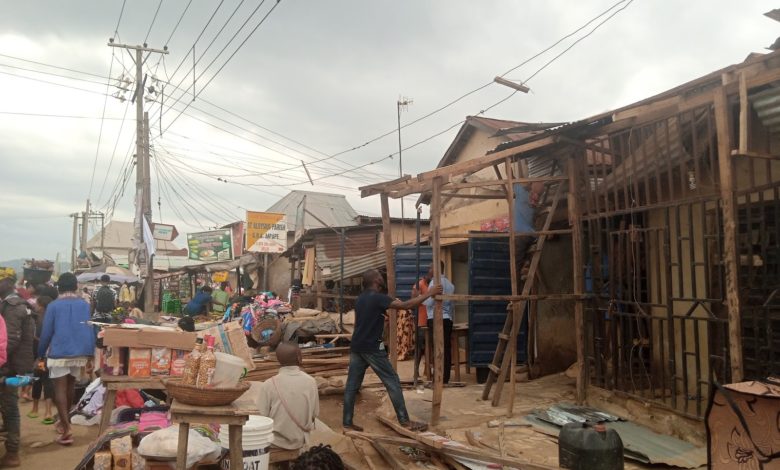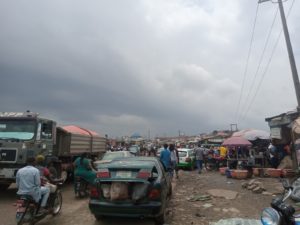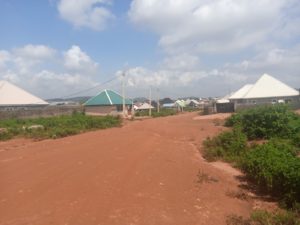#FCT Demolition: More Communities Live In Fear Of Bulldozers
Residents of Mpape, Dutse Makaranta, and Ushafa, in Abuja’s suburb, face the threat of forced eviction. Before them, others in areas such as Lugbe have had their fair share of the sad experience.

Too often, residents in Abuja communities experience demolitions; at their homes, shops, and other properties which most times serve as a means of livelihood. The reasons given by the Federal Capital Territory Administration (FCTA) include development plans, security concerns, need for road expansion, or a property’s inconsistency with the Abuja master plan.
Abuja, Nigeria’s capital, was created by a military decree in 1976 from parts of old Kwara, Niger, Kaduna, and Plateau states with the bulk of landmass carved out of Niger State.
However, unlike other states of the federation which have governors, Abuja is administered by the Federal Capital Territory Administration, headed by a minister appointed by Nigeria’s President.

Three communities for possible demolition
Mpape, Dutse Makaranta, and Ushafa have been notified by Ikharo Attah, the Chairman, FCT Ministerial Committee on City Sanitation, to prepare for a clean-up demolition exercise, following the levelling of 473 illegal structures in Iddo Sarki community including multiple shops in Lugbe.
Asides witnessing the wreckage of their properties in Lugbe, shop owners also watched as their goods were stolen by touts, making it a double loss.
Residents and officials from the three communities told HumAngle that no official notice had been served to them although there are such rumours.
“No official notice was served to the community or the chief, not even a prior meeting. All we have heard is from the radio and media,” Danladi, the secretary to Mpape chief’s palace, said.
The story is the same for residents and chiefs of Dutse Makaranta. About four residents claimed they are not aware of a possible demolition.
However, the acting secretary of Ushafa community, Abdullahi Tabwa, confirmed that there was an unofficial dialogue between the community heads, FCT waterboard authorities, and FCT Development Control on how best to resolve the demolition threat within 1,000 metres of the water board boundaries for fear of future floods. But, he stated, no official notice had been served to the chief’s palace.

“The water board administrators had invited FCT Development Control to come for demolition earlier this year, but we’ve been having a series of meetings and they had promised to get back to us in another soon to be held meeting, but no official notice has been served to the palace,” Tabwa said.
Residents live in panic
After demolition rumours spread, shop owners in the Mpape community started removing their extended structures; containers and zinc roofs, in readiness.
Mirabel Johnson, in her mid thirties, sells bottled drinks in one of the shops in Mpape. She told HumAngle she is prepared to accept her fate if the demolition eventually affects her shop. While agreeing with the government on the need to clean-up Mpape and expand the roads, she noted that the government regardless cared less about the rights and welfare of the citizens.
“How about compensation plans for supposedly affected citizens whose survival is dependent on the shops, especially in this hard period?” she asked hopelessly.
“I have removed the extension in front of my shop and maintain the space in my shop alone,” Mr Haruna Bala, another shop owner who sells fabrics said.
Since no official notice was served on residents and shop owners, confusion lingers as to the true date of demolition. Some are of the opinion that the task force will come on Wednesday Aug. 4, 2021, while others believe the operation will take place on Friday August 6, 2021.
This is not the first wave of demolitions
In 2016, Coalition of FCT Indigenous Groups, an association of the nine tribes that claim Abuja as their ancestral home, beckoned on the government to stop pushing them out of their ancestral land without any plans of resettlements.
In the same year, Dagbana in the Jikwoyi community was issued a 48 hour notice of demolition. But with the timely intervention of the Original Inhabitant Development Association of Abuja (OIDA) challenging the actions of the government in court, the demolitions were suspended, Danladi Jedi, the association’s president told HumAngle.
He further added that the association, in challenging the government’s indiscriminate eviction and displacement policies, has over ten cases in court for adjudication. Some cover areas like Karu, Tungan Maje in Zuba, Bwari, Kuchi Baidna, including hectares of land allegedly allocated unlawfully as grazing reserves.
The Public Complaints Commission (PCC) made a frantic call to the FCT Minister, Muhammed Bello on Sunday July 25, 2021 to suspend every demolition-related exercise in the nation’s capital territory by FCTA and FCT Development Control pending the determination of the petition by natives of Abuja.
FCT Development Control avoided comments on the possibility of continued demolition in the three communities when contacted by HumAngle.
Position of the law
In an Amnesty International report, the Abuja high court had in 2017 declared illegal and indiscriminate, a planned demolition of Mpape community, after five years of litigation.
“Nigerian authorities have an obligation to refrain from forced evictions and make policies towards realising the right to adequate housing and security of tenure for the residents,” the court affirmed.
The ruling was a grand victory for Mpape residents who had lived with fear of demolition since 2012. Institutional forced eviction is an officially sanctioned act which has many harmful consequences for the affected persons or group and it is usually violent and socially, economically or racially discriminatory in nature.
Forced eviction is prohibited under Nigerian land law and under international legal instruments. In exceptional cases backed up by court order, all due process of alternative remedies or full consultations with supposed affected individuals is expected.
United Nations Human Rights Commission Resolutions 1993/77 and 2004/28 affirmed that forced evictions violate human rights. In addition, adequate written notice is to be served to affected persons within a reasonable time with plans of compensation.
All of which are yet to be complied to in Abuja.
Support Our Journalism
There are millions of ordinary people affected by conflict in Africa whose stories are missing in the mainstream media. HumAngle is determined to tell those challenging and under-reported stories, hoping that the people impacted by these conflicts will find the safety and security they deserve.
To ensure that we continue to provide public service coverage, we have a small favour to ask you. We want you to be part of our journalistic endeavour by contributing a token to us.
Your donation will further promote a robust, free, and independent media.
Donate HereStay Closer To The Stories That Matter




